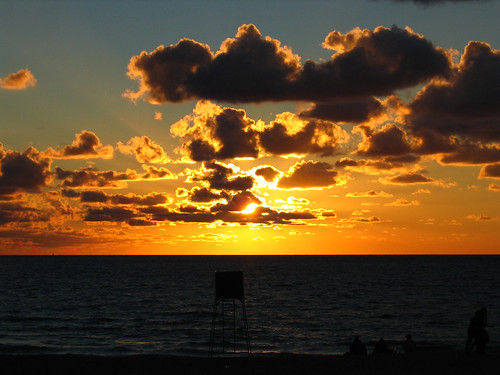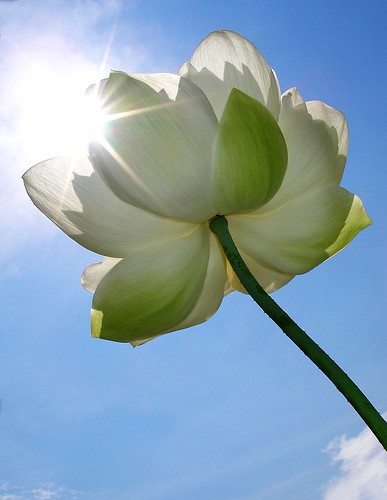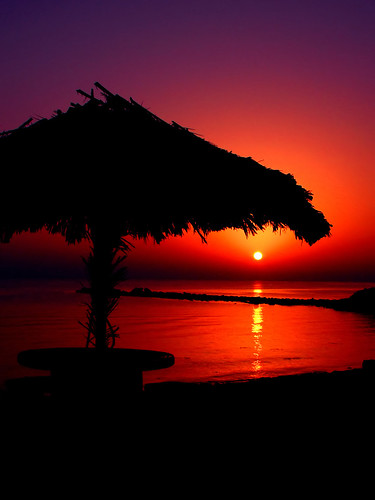Si you know as African bloggers and bloggers worldwide to support each other is a must. Today I will share with you an interview conducted by people from www.somethingcool.ca when they had a chat with the African blogger Sunny. You can find her blog at: Project Sunshine
Enjoy; be blessed;bless others;Mwangi

Project Sunshine Aims to Bring Some Light to Africa
Over lunch the other day, a friend of mine and I were discussing some weighty matters: tax season, the writer’s strike, global warming, when our conversation turned to what my friend called “the most doomed nation on Earth” – Africa.
“Notice how there’s never, like, any good news that comes out of that place?” my friend commented while taking a bite of his grilled cheese sandwich. “Which is understandable, really – people die over there in the thousands every day from everything from war to AIDS. I’m pretty sure people just aren’t supposed to live there.”
It was hard to argue. I can’t remember the last time I read something positive about the continent of Africa. The last image in the news I could recall seeing from there was that of a teenage boy holding a bloodied machete in his hand – not exactly the picture of peace and prosperity. I knew, though, there that had to be some good news from Africa, so I went home, logged on and went in search of something nice to say about Africa.

My mission was a partial success. I found something interesting about Africa – and someone equally as interesting to go along with it. My journey took me to “Project Sunshine” – a blog written by an articulate and intelligent woman named “Sunny”, who informs the masses about Africa. A recent blog etnry entitled “Reporters: Get Kenyan Stories Right” was all about the media’s misrepresentation of Africa.
“As many of the headlines and tasteless display of our maimed and dead, there still exists compelling evidence that suggests that Africa in the eyes of many foreign journalists seems to have no history beyond the present,” Sunny wrote. “Africans can be evil savages with a thirst for blood or a disarrayed people in need of redemption, and, that Africans are inherently different. Do these assumptions justify treating images of Africans at their weakest as voyeuristic novelty cards for front pages? Many good stories exist, however, the best stories came from people with a genuine desire to connect the world with a comprehensive view of the post-elections violence.”

Intrigued, I decided I needed to get to know Sunny a bit more and learn more about what motivates her to write her blog, described as “Women, Technology, Social Entrepreneurship and Other Developments”. It turned out she was more than happy to answer my questions, and even had some of her own.
Interview with Sunny
SCN: Sunny, I have to ask – why did you start your blog and why is it so important to you?
I started blogging in 2005.It is a space where I express my views on media, Africa, Kenya, women, sustainable development and politics. I realized very early in my web log writing that there are not as many women, particularly young women who have traveled inter-continentally talking about issues as I would have hoped. I am extremely fortunate to have had the opportunities and education I got, especially as an African woman and I hope to share more about my experiences and those of other women through this blog. I believe that there is still so much hope in Africa, that we are still very high on the happiness index, and that we are still an innovative space on the planet.
You know so much about the continent, do you live there or something?
I am based in the United States. For the majority of my life, however, I lived in Nairobi, Kenya.

A friend of mine and I were having lunch and he said to me, “Africa is the most doomed nation on earth.” – do you agree or disagree?
First off, Africa is not a nation. It is at continent of over sixty independent sovereign states. Kenya alone has forty two separate ethnic communities or tribes alone. Africa is the richest nation right now, and that means that we have intense pressure to tap into these resources, particularly to participate in the global economy. The most striking part about Africa is that we are ‘doomed’ to forever receive foreign aid. What people do not know is that there is more transfer from the global south to the north than ever before. Consider all the repayment of debt placed upon African nations and the crippling effects of structural adjustment programs that have rendered many nations incapable of competing on the world market.
Do you think the media is doing a good job with its reporting in Africa? I’m guessing you don’t.
The media is not doing enough balanced reporting on Africa. Faced with the task of presenting world news to a globalized audience, many of the media houses have been slow to catch on to the need for accurate reporting of news on the ground. There is a heavy dosage of the ‘famine, disease and death rhetoric’ and not enough of the positive. For instance few media houses have reported on open source appropriate technology for agriculture, when this innovation is taking place right on the continent. Fewer journalists, however, are willing to be in residence to learn the stories.

There is a double standard in the portrayal of many of the stories. In Kenya this past month, for example, we were awash with images of the injured, the dying and the dead on every major news site. I am yet to see mortuary photos here or the photos of burn victims, scars and all from events in the United States. Why did the editors feel so inclined to portray these gut-wrenching images of Kenyans instead? There were literally thousands of these images, which scarcely respected the dignity of the victims and their families by some modesty. At the same time, the silent epidemic of gender violence in the post-elections period has gone vastly underreported, as well as other key initiatives to stem the violence.
There is a resurgence however of accurate media reporting from independent media houses and internet sites. That is encouraging. For instance for commentary, we relied on Kenyan bloggers, such as KenyanPundit ( kenyanpundit.com) and now on reporting websites such as Ushahidi.com. (‘Ushahidi is Swahili for “witness”) so for instance, when an incident of violence or a successful peace initiative takes off, one can report this via SMS/Text to the website.

Do you think North Americans would care more about what goes on there if they knew more about it?
It’s interesting. I just spoke with a student colleague about the violence surrounding women in the internally displaced camps in Kenya, and though I had immersed myself in learning about this issue, I was still shocked to hear that she had not yet heard about any of these developments outside of the media coverage of the high level negotiations with Annan and earlier with Asst Secretary of State, Jendayi Fraser. She, like other North Americans would care a lot more if these were issues that they had the choice to view if reported more often.
I think that particularly among the younger generation there is an interest in travel to Africa and for initiatives such as the (Red) and ONE campaigns and Darfur Action. There is a growing thirst for knowledge among students and the online community for instance as we see from this interview. It is hard to tell whether this interest is purely celebrity or more long lasting. I do believe, however, that by and large North Americans are shortchanged with the news from early on. Despite the presence of web news and even newspapers reporting on the minute, there still is not enough information about Africa in the education systems of many states and regions. The interest in world affairs certainly needs to be taught early enough so that the population acquires a taste for international stories to a greater depth.

What do you do when you are not blogging?
I am an undergraduate in urban studies and economics. So far I am mastering the fine art of thirty-minute cooking and navigating the maze of summer jobs and internships for my 2008 experience.
Do you think there is a simple “solution” to Africa that other nations could implement?
Africa’s needs can only really be solved by Africans. One has to imagine the massive brain drain from our research laboratories universities and think-tanks that simply make us poorer for our own experts, and then note the disincentives to return home for many of the leading scholars and minds after they complete their studies. We are part of a diverse and interconnected globe and so we must find ways to make sustainable development a reality, with as much local ownership of the initiatives as possible.

What about solutions to other nations, like, say, Iraq?
Iraq is a complicated region. I do not think that here is a simple solution. Many people have lost their lives and the fighting forces are exhausted on both sides, and need to seek a peaceful end to this involvement.
Many people may not know this but, through international media such as the Beeb, people in the most remote regions of Africa have strong opinions about the war in Iraq. We are living in an interwoven world and none of us can afford not to think of the potential impact of the war on future generations, whether we are in rural Uganda or the fashion runways of Cape Town
What has the response to your blog been? Is it making a difference? How many people read it?
So far, the response to my blog has been rather good with a mixed readership. My blog is also part of the Kenyan Bloggers Webring, an aggregator of blogs by Kenyans and friends of Kenya worldwide (kenyaunlimited.com)

How long do you intend to keep highlighting issues in Africa?
We have a saying that you can never count the hairs on your head, they are too many. Likewise, there are still so many African stories to be told that I will never tire of sharing my home continent with the world and engaging in activism about it.
You know, there are many of us who believe Africa is about as Internet-savvy as an Inuit village. Your discussion about Kenyan bloggers prove this is false. Why do we have this erroneous portrayal of African technical knowledge? And just how connected is Africa?
In many pictures of Africa, there are hardly any buildings, nor people for that matter. A lot of the Africans portrayed are herding or just part of the landscape, (which is amazing by the way!) It is hard to recreate images of a connected populace whether by internet or by mobile phone. Africans have, in many cases leaped into the information age. Although many countries, and I can only speak of Kenya, are hampered by infrastructure and cost hurdles, there is a strong desire to keep at pace with the rest of the world technologically.
Finally, how would you characterize the average North American’s relationship with the mainstream media? Are we simply gullible, or does the media feed us only what we ask for?
For a region with hundreds of millions of people, there is too little diversity in the content. It puzzles me that these societies, widely believed to be free and democratic are not demanding more broad-based content from their media houses. But if the ratings are the only measure, then we will continue to be fed a mixture of Britney-reality TV and truly innumerable advertisements.

Oh great. At least we have your blog to get us through.
I hope I am making a difference. That should be our goal right?
Tags: African, African leadership, African psychology, mass media
[…] on……the topics are many, it is the time that is little. It is the time that is little. Sunny from Project Sunshine wrote to me and asked me to write a letter where I basically gave men tips on how to treat women. I […]